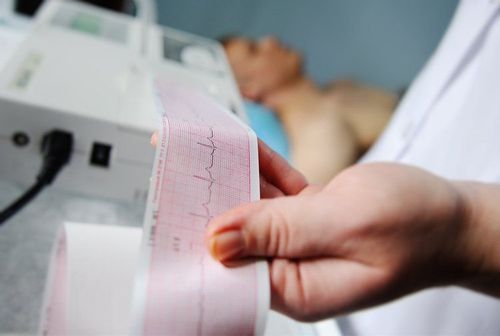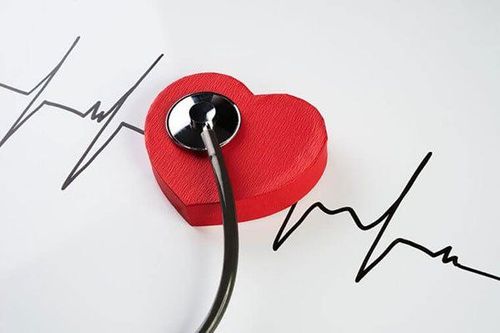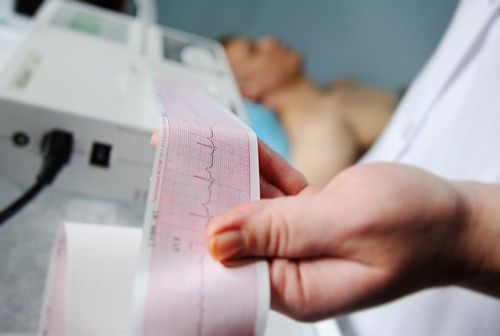This is an automatically translated article.
The article is professionally consulted by Master, Doctor Pham Van Hung - Department of Medical Examination & Internal Medicine - Vinmec Danang International General Hospital.1. When to go for a cardiologist
Cardiovascular examination is an extremely necessary job, helping to timely detect cardiovascular disease status and provide appropriate treatment plans. You should go to reputable medical facilities for a cardiovascular examination when you feel yourself having the following signs:
1.1 Chest tightness This is one of the most typical signs of heart disease, although the cause of chest tightness may be due to other factors, but the heart's pumping will be affected by the pressure on the chest.
1.2 High blood pressure High blood pressure is a sign of increased blood pressure of the heart, which means that the heart is working with a heavier capacity, which can lead to heart attacks and strokes.
1.3 Shortness of breath, dizziness, heart palpitations This can be a sign of cardiovascular diseases such as arrhythmia, coronary artery disease,...
1.4 Diabetes According to studies diabetes or even Diabetes is closely linked to cardiovascular diseases.
Poor blood sugar control not only affects the blood vessels, but also increases the risk of coronary artery disease for the patient.

1.5 Smoking Cigarettes or passive smoking: Smoking has a bad effect on the heart by causing high blood pressure.
1.6 High amount of cholesterol in the blood High cholesterol in the blood sticks to the walls of blood vessels, obstructing the circulation, causing cardiovascular diseases.
1.7 Chronic kidney disease Chronic kidney disease affects blood pressure and capillaries, and people with kidney disease are also at risk for heart disease.
1.8 Heredity Cardiovascular disease does not exclude genetic factors, if you notice that there are symptoms of the disease with a family history of heart disease, you should pay attention to the examination and monitoring of cardiovascular status. mine.
2. What is the process of cardiovascular clinical examination?
Here are the basic steps in clinical examination to help patients better understand and avoid anxiety when going to medical facilities for cardiovascular examination.2.1 Ask questions during a cardiac exam During a cardiac exam, your doctor will ask questions about common signs or symptoms of heart disease such as shortness of breath, cyanosis, palpitations, pre-cardiac pain, fainting, etc. ..
In addition, some diseases or related problems were also asked to help support the diagnosis such as: Does the family member have a history of heart disease; neurological condition; Work; living habits; Hormonal disorder,...

2.2 Physical examination of cardiovascular patients 2.2.1 Patient position During cardiac examination, the patient is assigned to lie supine position, legs slightly bent, back and knees high, open the button of the shirt to expose the chest. before.
2.2.2 Patient observation The doctor can make a diagnosis based on some of the following symptoms:
Skin and mucosal color: Purple lips, congenital heart disease or heart failure; Clubbing fingers and toes: congenital heart disease or subacute endocarditis. Chest shape: The ribcage of people with heart disease as a child is often deformed. The chest of children with pericardial effusion will have a slightly convex sign. Heart beat: People with cardiovascular disease often have an irregular heart rhythm, if the apex of the heart is pounding, it is likely that the left ventricle is enlarged or the heart is enlarged; Weak heart beat: In case of pericardial effusion or fat people with thick chest wall. Aortic aneurysm: For people with this cardiovascular disease, a heart-beating tumor will appear in the intercostal space close to the sternum. Neck: Distended neck veins are a sign of right heart failure, a strong aorta is a sign of aortic regurgitation. In addition, the doctor will also check to see if the thyroid gland is enlarged because in some cases hyperthyroidism can cause cardiovascular complications. Epigastric region and right hypochondrium: The epigastrium pulsates with the heart rate, which may indicate an enlarged right heart; Right heart failure or total failure often causes the liver to enlarge, so it is easy to see that the right hypochondrium is thicker than the other side.
Recommended video: How many times per minute is the normal heart rate?
2.2.3 Direct Palpation Palpation is a method of cardiac examination to help doctors identify abnormalities of the apex of the heart. Then the doctor can make some predictions to localize the disease such as:
Heart is pushed to the side: effusion and pneumothorax in the pleura on one side; Cardiac retraction: Thickening of the pleura and pericardium; The apex of the heart is not clear: Pericarditis with effusion or the patient has thickening of the pericardium; Heart palpitations: left heart enlarged or possibly aortic regurgitation 2.2.4 Auscultation Auscultation Auscultation is the most important method in examining the precordial region. To accurately diagnose the condition of a cardiovascular patient, the doctor will rely on the patient's symptoms and professional knowledge such as:
Change in heart sound Heart rate change Heart murmur Pericardial rub above some basic steps in clinical examination in cardiovascular patients. After performing the examination, the doctor will make initial preliminary judgments, to confirm more accurately the cardiovascular status, the patient will be assigned blood tests, chest X-ray, electrocardiogram. Cardiogram,... Then the doctor gives the final diagnosis and advises the appropriate treatment plan. Currently, Cardiovascular Center - Vinmec International General Hospital is one of the spearhead centers. leading the country in examination, diagnosis, screening and treatment of cardiovascular diseases. With the convergence of a team of experienced, reputable experts in the field of surgery, internal medicine, interventional cardiac catheterization and the application of advanced techniques in the diagnosis and treatment of diseases. Cardiovascular management, along with a system of modern equipment, on par with the most prestigious hospitals in the world such as: 3 Tesla MRI machine (Siemens), 640 CT machine (Toshiba), other equipment Advanced endoscope EVIS EXERA III (Olympus Japan), Avace high-end anesthesia system, Hybrid operating room according to international standards... The Cardiovascular Center at Vinmec International General Hospital has achieved many successes. work and gain the trust of a large number of patients.
Please dial HOTLINE for more information or register for an appointment HERE. Download MyVinmec app to make appointments faster and to manage your bookings easily.














